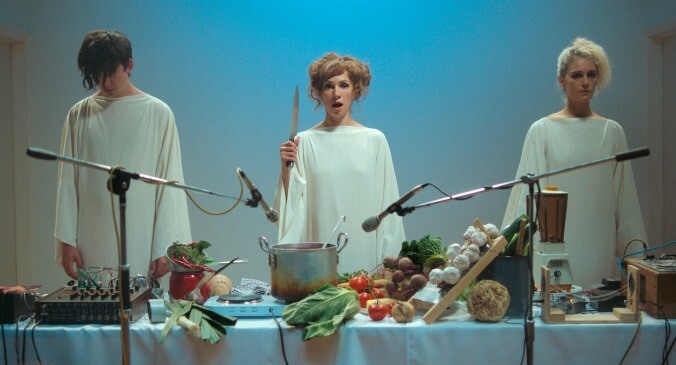Flux Gourmet showcases a surreal (or is it weird?) buffet of creativity
Asa Butterfield and Gwendoline Christie help filmmaker Peter Strickland explore what it takes to develop art as part of a team

People regularly throw the word “surreal” around simply to mean weird. But surrealism as an artistic movement is a specific pursuit of the unconscious; probing the irrationality of dreams to reveal a deep truth, often expressed through the juxtaposition of complex, rarely-grouped-together ideas. Doctor Strange’s inter-dimensional portals, for example, are weird, but not surreal. Flux Gourmet’s “Sonic Catering Institute,” a country manor in Lord-knows-what time or place, functioning as an artists retreat for “culinary and alimentary performance,” is surreal. What’s weird is how, after enough time, it starts making sense.
This is the fifth narrative feature for Strickland, whose credits include the playful Giallo-ish thriller Berberian Sound Studio, and In Fabric, the episodic tale of a haunted red dress. His towering achievement thus far is the shocking-but-heartbreaking, elegant-but-filthy psychosexual drama The Duke Of Burgundy, a compassionate May-December lesbian S&M romance with not a lick of nudity, but parlor room talk about “human toilets.” (You kinda have to see it to believe it.)
Flux Gourmet’s world is similar to the one in Burgundy in that it is also sealed off from reality, and nobody is for a minute joking. But that doesn’t mean audiences without the right radio receiver won’t be laughing. This is, after all, a movie about a guy who spends much of the running time worried he’s about to rip a fart in sophisticated company.
The man with tummy troubles, Stones, is played by Greek actor Makis Papadimitriou, a bit reminiscent of Berberian’s Toby Jones. He works as a “dossierge,” or in-house diarist for the goings-on at the Sonic Catering Institute. This means lurking in the background and scribbling notes while this season’s artists-in-residence workshop their latest pieces, interviewing them when he can. Because this is a surrealist film, he also shares a barracks with everyone (worrisome when you have debilitating intestinal gas) and he’s also privy to the after-show receptions, which are actually psychedelically shot orgies.
The visiting artists are a group of avant-garde musicians. No, wait, they are chefs. Or performance artists? Well, a little bit of everything. Their work integrates sound and food—the hum of a whirling blender, the sizzle of a pan—set to poetry, dance, and evocative lighting. It starts strange and only goes from there. Manifestos are read (lots about sex and omelettes) and there’s plenty about the Patriarchy and how it relates to a hot meal.
Is this a joke? No, absolutely not, but it is hilarious. The group is led by Elle (Fatma Mohamed), a visionary, albeit a strict and somewhat uncaring one. Her two aides are Billy (Asa Butterfield) and Lamina (Ariane Labed), both former lovers who tinker with knobs and buzzers and mop up the extra virgin olive oil when it spills.
Running the facility is Jan Stevens (always referred to by her full name) a preposterously outfitted Gwendoline Christie. She seems, one minute, to create a welcoming place for visiting artists, but will swoop in with creative tweaks the next. She’s also dealing with a sour grapes collective (The Mangrove Snacks!!) who were denied a residency, and have taken to acts of artistic terrorism. (They use dead terrapins in their attacks, for some reason.) Also in the mix is a tongue-clucking doctor (Richard Bremmer) reeking of British inbred conservatism.
As Elle and Jan Stevens begin to lock horns (at specific issue, Jan Stevens recommends toning down the use of a flanger) Elle’s cohorts begin planning their exit from the collective. Our narrator Stones, however, continues undergoing tests from our grouchy doctor which, in keeping with surrealist logic, becomes part of Elle’s art. Have you ever wanted to see a colonoscopy as if it were staged at the Donmar Warehouse? Now, finally, is your chance.
Flux Gourmet is very much a “not for everyone” type of movie, but even people unwilling or unable to connect with it must recognize that it isn’t simply weird for weirdnesses sake. Beyond the obvious theme of the artist’s eternal struggle with those who offer patronage only to start shortening the leash, there’s a frank look at just how strange it is for people to come together to make art in the first place. It is difficult enough for someone to create on their own. To do so as a collective is just begging for trouble. (Indeed, how many film directors over the decades have thrown up their hands to ask “Why wasn’t I an author or a painter?”)
Now imagine how hard it is to create meaningful (and commercially viable) soundscapes from from smeared chocolate icing. That Flux Gourmet ends up being such a rich text is truly surreal.